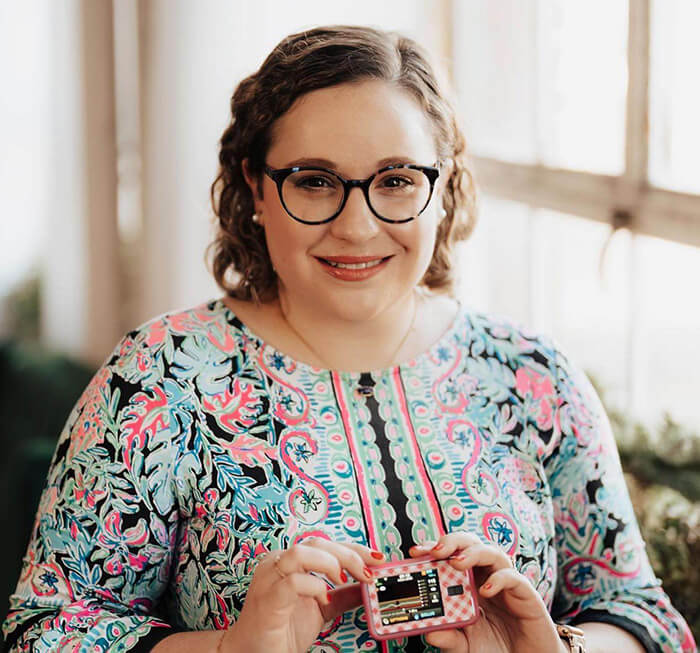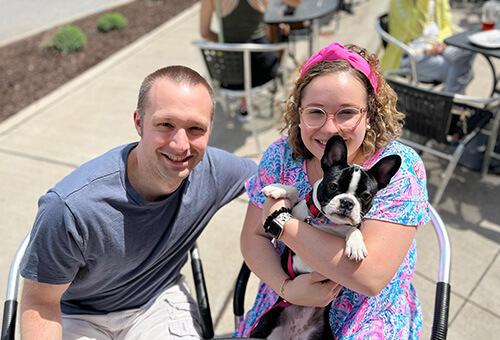Real-world Observations and Passion Delivers a Diabetes Financial Tool-kit Solution for Young Adults
May 15, 2023
UH Research & Education Update | May 2023
Julia Blanchette, PhD, RN, BC-ADM, CDCES, was first diagnosed with Type 1 diabetes (T1D) at age 7. At such a young age, she was inspired to become a nurse by many amazing caregivers who guided her throughout her numerous pediatric medical visits.

Julia finished her PhD in Nursing Science from the Frances Payne Bolton School of Nursing at Case Western Reserve University, followed by a post-doctoral fellowship at the University of Utah College of Nursing in Integrated Diabetes Management.
Her idea for per PhD dissertation research study stemmed from her time in a Diabetes Camp where she was the nurse for more than 30 adolescents with diabetes. She learned that not everyone had a support system to manage diabetes the way she did. Around the same time, she started to experience her own challenges of diabetes healthcare while transitioning to adulthood. These experiences fueled Julia to dig deeper and understand the psychosocial and financial barriers better as young adults transition from pediatric to adult diabetes care. She started researching available resources for young adults to help them understand insurance and how to prepare for the healthcare costs they would endure as adults. Julia found that more literature needed to be available about navigating health insurance and finances, and almost nothing exists specifically to educate young adults with T1D.
Julia’s PhD dissertation study, funded by Sigma Theta Tau, included a national sample of 413 young adults with T1D between ages 18 and 25 recruited from the T1D Exchange Clinic Registry. She discovered that higher levels of financial stress negatively impact glycemic outcomes and diabetes-related quality of life. For her post-doctorate training, Julia was awarded a Mentored Fellowship from the Association of Diabetes Care & Education Specialist (ADCES) Foundation and the Certification Board for Diabetes Care and Education to work with a community advisory board to address the financial stress in young adults to improve self-management outcomes.
As a solution, the community advisory board created a 10-part short video series focused on self-advocacy, self-confidence, and financial stress help. The pilot financial toolkit had high feasibility and acceptability. It showed promising trends in decreasing financial stress, increasing health insurance literacy, diabetes-specific quality of life, and readiness to transition to adult diabetes care in a small sample of highly-educated, majority privately insured young adults from Utah.
Both literatures and Julia's clinical experiences indicate that individuals with public insurance have more barriers of understanding health insurance and are at heightened risk of stress. It would be valuable to expand the study and toolkit to include more public health insurance and underrepresented participants.
Leona M. & Harry B. Helmsley Charitable Trust (Helmsley) $2.25M grant over three years to Study "Type 1 Diabetes Financial Toolkit for Emerging Adults."
We congratulate Julia on her recently awarded grant. The project aims to develop, refine and test a T1D financial toolkit in collaboration with a community advisory board. In addition, the study will be expanded to a broad audience by including participants of underserved, publicly insured, and racially and ethnically diverse populations in the clinical validation of the toolkit for wide acceptability and utility.
The three-year study consists of three phases. Phase I includes building the research team and developing the concepts and resource platforms with the community advisory board. Phase II consists of a randomized control trial. Finally, the research team will complete the data collection, analysis, and dissemination in Phase III.
Four academic medical centers were selected to participate in the randomized control trial phase to ensure a diverse audience, including University Hospitals, UCLA Children's Hospital, Montefiore Hospital, and the University of Florida. The study will also recruit through the T1D Exchange, a nonprofit organization dedicated to accelerating therapies and improving care for individuals with Type 1 diabetes.
A key collaborator for the study is The Diabetes Link, the only nonprofit organization dedicated to young people with diabetes, providing them with resources, programs, and support. Through this collaboration, Christina Roth, CEO of The Diabetes Link will serve as a citizen scientist Co-Investigator. The Diabetes Link research team members will also help create the videos, develop the dissemination plan, and maintain the long-term resources that young adults with T1D from various backgrounds can access and utilize free of charge.
Partner with Collaborators to Find Solutions
Healthcare is challenging for patients and providers. Nurses, working at the forefront with patients, can quickly identify barriers that could be removed with new ideas and solutions. For those interested in conducting research, Julia advises finding a trusting partner(s) to help bring the vision to fruition. She has met many collaborators throughout her career who mentored her for personal and professional growth. As an undergraduate student, Dr. Rebecca Darrah introduced her to genetics lab research and the power of translational science to improve lives for individuals living with Cystic Fibrosis, another childhood chronic condition. Dr. Jamie Wood, along with her dissertation committee from Frances Payne Bolton, guided her on her PhD research project. Collaborators she met through ADCES, Drs. Michelle Litchman and Nancy Allen became her post-doctoral study mentors at the University of Utah. Dr. Betul Hatipoglu has been supporting Julia for years as her personal young adult diabetes provider, clinical colleague and now research mentor.
"It is hard to make it happen alone, but with collaborators, we lift each other, help build a research team, and push studies through. Your ideas are so important; find team members that can support you. ”
When asked about future plans, Julia hopes her patients will use the diabetes toolkit. She wants to modify the toolkit to fit older adults with diabetes under Medicare. It may not be videos, but we would like the older adult community to access different support systems that provide them with the resources as they navigate the healthcare system. In addition, Julia hopes many other patient populations could adopt the toolkit in the long term.
FIVE IN FIVE with Dr. Blanchette:

- What is the last book you read? Real Food for Pregnancy: The Science and Wisdom of Optimal Prenatal Nutrition. I love that it is written by a certified diabetes care and education specialist who wants to better help her patients.
- Where is your favorite place to go in Cleveland? I live with my husband, Derek, and dog, Poppy, in the Fairmont area. We love to walk around the neighborhood and explore the great restaurants in this area.
- What is your favorite place to eat in Cleveland? Barrio
- Would you rather swim the Atlantic Ocean or bike across the United States? I almost said swim. Although I was a swimmer in high school, one of my biggest fears is fish, so I would choose bike across the U.S. Plus, I love traveling within the United States.
- How would your colleagues describe you in 3 words? Energetic, engaged, and colorful.
Tags: Diabetes, Grant Funding, Research, Medical Innovations


